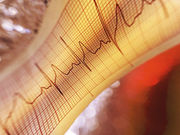Use of Seattle and refined criteria reduces costs per athlete, per serious diagnosis versus 2010 ESC recs
TUESDAY, Aug. 9, 2016 (HealthDay News) — Contemporary electrocardiographic (ECG) screening criteria can reduce the costs of screening of athletes, according to a study published in the Aug. 16 issue of the Journal of the American College of Cardiology.
Harshil Dhutia, M.B.B.S., from St. George’s University of London, and colleagues examined the costs of ECG screening in athletes according to the 2010 European Society of Cardiology (ESC) recommendations. A total of 4,925 previously unscreened athletes (aged 14 to 35 years) were prospectively evaluated with history, physical examination, and ECG. Athletes with abnormal results underwent secondary investigations. The authors evaluated the impact on cost after applying the Seattle and refined criteria.
The researchers found that on the basis of 2010 ESC recommendations, 21.8 percent of athletes had an abnormal ECG: 11.2 percent required echocardiography, 1.7 percent exercise stress test, 1.2 percent Holter, 1.2 percent cardiac magnetic resonance imaging, and 0.4 percent other tests. The number of positive ECGs was reduced to 6.0 and 4.3 percent, respectively, with the Seattle and refined criteria. Using all three criteria, 0.3 percent of athletes were diagnosed with potentially serious cardiac disease. Using 2010 ESC recommendations, the overall cost of de novo screening was $539,888 ($110 per athlete and $35,993 per serious diagnosis). The cost was reduced to $92 and $87 per athlete screened and to $30,251 and $28,510 per serious diagnosis, using the Seattle and refined criteria, respectively.
“Contemporary ECG interpretation criteria decrease costs for de novo screening of athletes, which may be cost permissive for some sporting organizations,” the authors write.
Full Text (subscription or payment may be required)
Editorial (subscription or payment may be required)
Copyright © 2016 HealthDay. All rights reserved.








